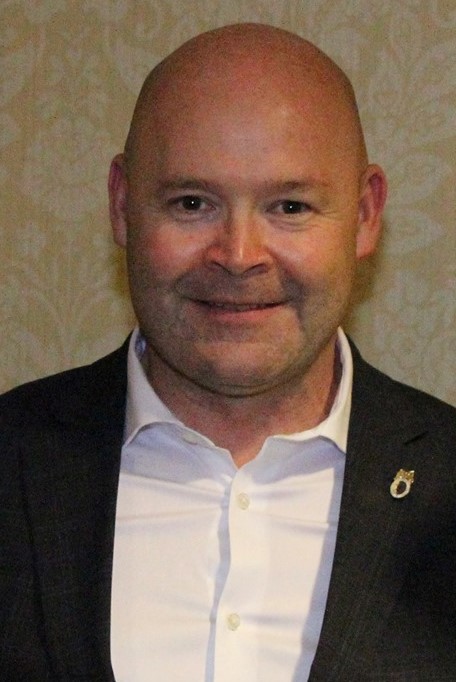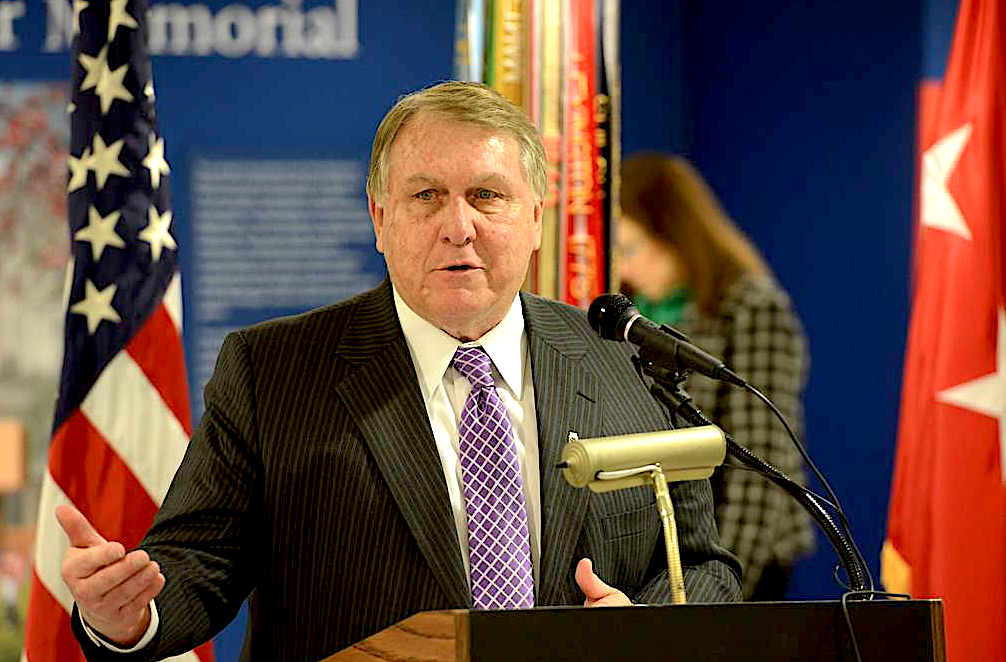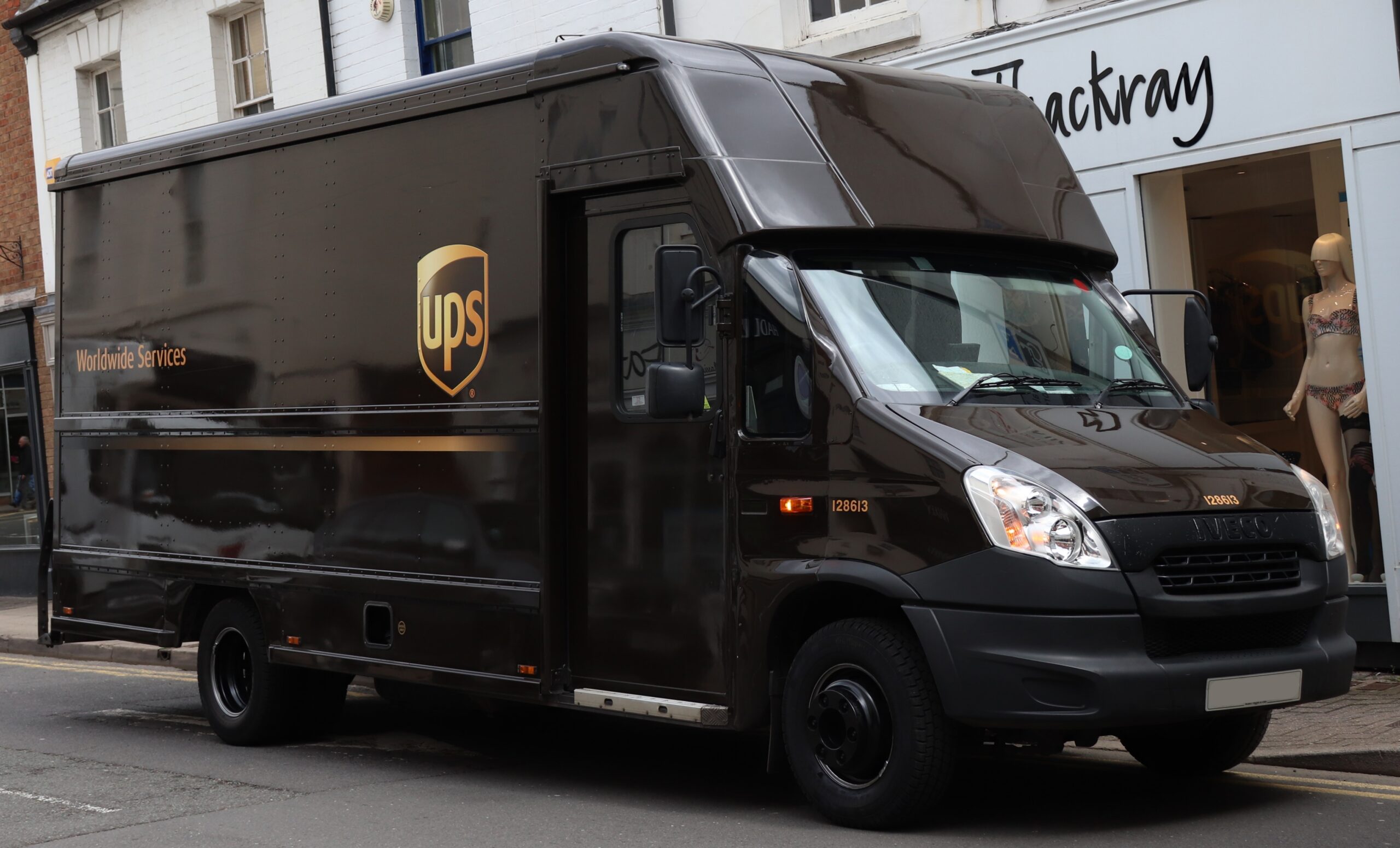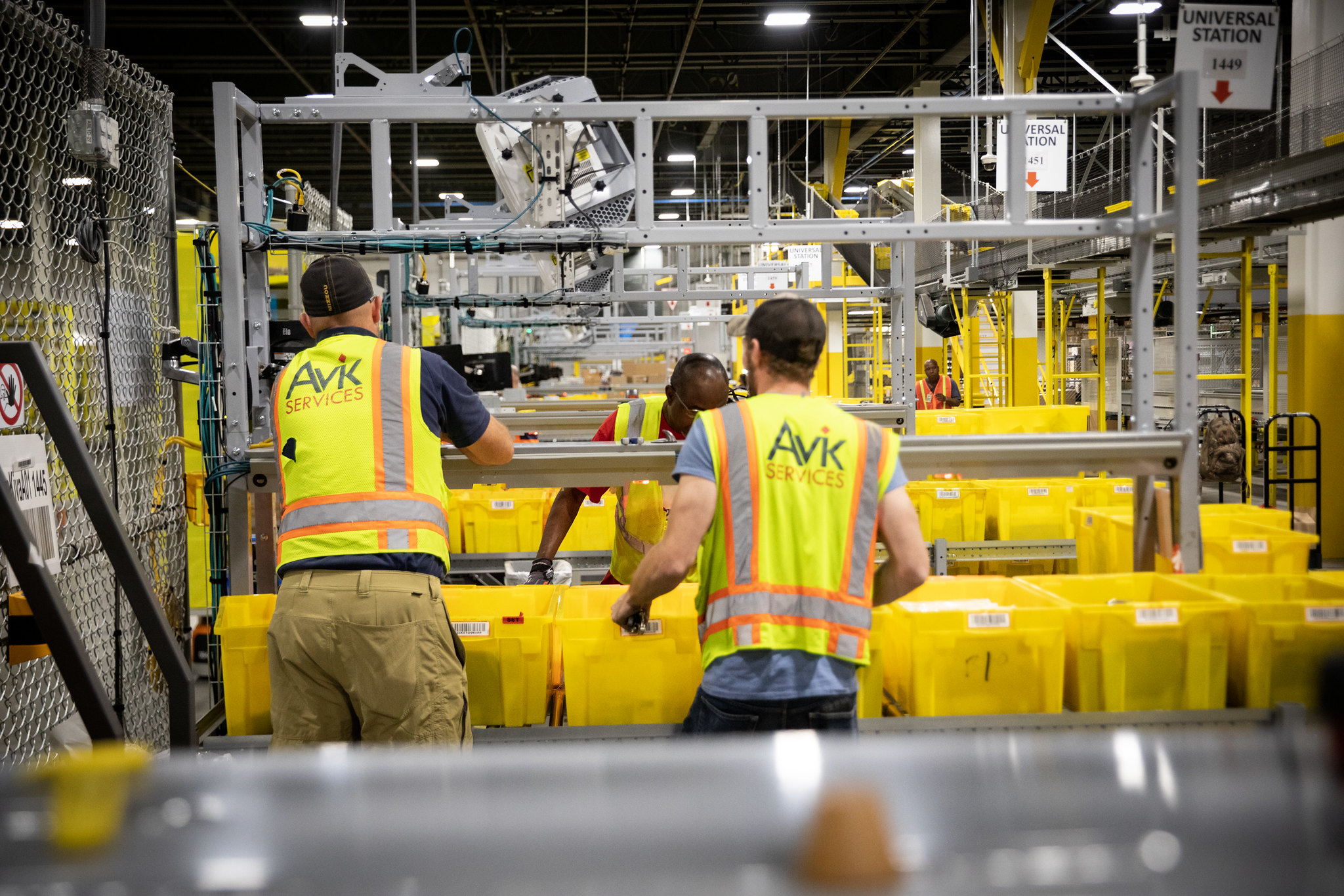The new leadership rode a wave of fury over concessions and weak contracts, especially at UPS, the union’s biggest bargaining unit, Alexandra Bradbury reports.

Teamsters Local 804 rally in April in New York outside a UPS customer center support 10 of its members, part-time workers who had just been fired. (Teamsterts for a Democratic Union)
By Alexandra Bradbury
Labor Notes
A new administration will soon take the helm of the 1.3 million-member Teamsters union. Teamsters United has declared victory.
It’s the first time in almost a quarter-century that a coalition backed by Teamsters for a Democratic Union has taken the driver’s seat in the international union.
The incoming president is Sean O’Brien, leader of New England Joint Council 10. He says his top priorities are to unite the rank and file to take on employers, organize Amazon and other competitors in the union’s core industries, and withdraw support from politicians who don’t deliver on union demands.

Sean O’Brien, incoming president of the Teamsters. (Tgmod, CC BY-SA 4.0, Wikimedia Commons)
Essential to organizing at Amazon or anyplace else, O’Brien argues, is winning enviable contracts for the existing Teamsters. “Our biggest selling point to potential members is showing in black and white what a union contract can do,” he said. “We’ve got to have a grassroots campaign to engage our members working in similar industries and showcase what Teamsters can do — and that means negotiating strong contracts that people want to be part of.”
In UPS negotiations in 2023, he says, the union must abolish the second tier of drivers, raise the starting pay of part-timers from $14 an hour to $20 and crack down on subcontracting and Uber-like deliveries by “personal vehicle drivers.” He and his running mates have pledged to strike UPS if necessary.
Five years ago, O’Brien won an Eastern region vice president spot on the incumbent slate of longtime President James P. Hoffa, who is retiring this year. But in 2017, Hoffa fired him as package division director after O’Brien insisted the UPS bargaining team should include opposition leader Fred Zuckerman, president of Local 89 in Louisville, who had led the 2016 Teamsters United ticket that nearly toppled Hoffa. Now Zuckerman will take the number two seat as secretary-treasurer.
The challengers rode a wave of fury over concessions and weak contracts, especially at UPS, the union’s biggest bargaining unit, where TDU and other Teamsters United supporters had campaigned for a no vote on a contract that would create a lower-paid second tier of drivers. After a majority voted no, Hoffa forced the deal through anyway. TDU’s demand to repeal the “two-thirds rule” that let him do it became a campaign issue; reformers got it done at this year’s convention.
Meanwhile UPSers have lived out the consequences of the bad deal: two-tier wages and another five years of rampant forced overtime and harassment from supervisors. “It doesn’t matter where we went when we were campaigning—that’s what everybody was furious about,” said Eugene Braswell, a New York City Local 804 UPS driver and TDU steering committee member who has been to Baltimore, New Jersey, and Philadelphia campaigning for Teamsters United.

James P. Hoffa, general president of the International Brotherhood of Teamsters in 2015. (U.S. National Archives)
The Hoffa-backed Teamster Power slate never stopped insisting the contract was good. UPS Teamsters evidently disagreed: in major UPS locals in Atlanta, Dallas, Chicago, Louisville, and New York they voted 80 to 95 percent for O’Brien.
As hotly contested as this election was, overall turnout was just 15 percent. “The reason we have such a low turnout is the leadership is disconnected from the membership,” said Teamsters United candidate John Palmer. But organizing moved the needle; campaigners in Chicago’s 15,000-member Local 705 achieved 31 percent turnout, with 95 percent of the votes going to Teamsters United.
Now the Hard Part
It took years of organizing to get here. But the bigger task is what comes next—not just pointing to the problems confronting the union, but tackling them.
“We have to right the ship,” said John Palmer, a current Southern region vice president who will become an at-large vice president. (In 2016 Teamsters United won in two regions, giving the coalition six seats on the union’s executive board.) “It takes many, many miles to turn a battleship around in the middle of the ocean, and that’s what we have to do here.”
From contract campaigns to taking back our local unions, TDU members Teamster activists have been organizing from the bottom to win at the top. We're proud of the new day we've helped. The best and most important organizing is ahead of us and we can't wait to get started. pic.twitter.com/EYEH15AI26
— Teamsters for a Democratic Union (@TeamsterRnF) November 19, 2021
“If you want change, you have to change,” said Local 572 steward Frank Halstead, a Los Angeles grocery warehouse worker and TDU steering committee member. “The structure determines effectiveness. They’re going to have to reallocate money.”
For instance, rather than continue padding officers’ salaries with multiple titles, he wants the union to hire energetic full-time division representatives who can help locals in the same industry build a strategy to coordinate their bargaining, raise standards, and fight threats like automation.
“Under the current administration there are no full-time warehouse division reps,” Halstead said. “You have officials from certain locals who hold that title, but they can’t do two jobs; you can’t be a business agent at a local and a division rep. That’s the kind of stuff that has to stop.”
The organizing department needs restructuring too, said Palmer, who worked there for years. “We waste a tremendous amount of money flying organizers around the country,” he said.
“That time and resources could allow us to train people out of locals to do this. We need to have that skill on the ground everywhere; we don’t need a lot of specialists airdropped from D.C. who disappear the minute a campaign is over.”
UPS Strike in 2023?

(Vauxford, CC BY-SA 4.0, Wikimedia Commons)
August 2023, when the UPS contract expires, isn’t as far away as it might sound. “A contract campaign basically needs to start on day one,” said Chicago Campaign Coordinator Dave Bernt, another TDU steering committee member. “We need to have a national coordinated contract campaign to get members engaged, to use their engagement as leverage in negotiations.”
Making the strike threat more than a bluff starts with “basic communication,” Bernt said. He means headquarters should use methods like texting and social media to inform the 320,000 UPS Teamsters of the timeline and what’s at stake. But he also means member-to-member:
“Just as we campaigned for office, we need to have members go out to their gates and engage their membership, talk about the issues and talk about how to prepare for negotiations. Start socking away money; don’t make any major purchases.”
Braswell agrees: It’s time to encourage members to put away $20 or $50 each pay period, and to make the word “strike” more familiar, less scary. (The union also has a strike fund of more than $300 million that hasn’t been used in decades, O’Brien says—and he plans to put it to use.)
“UPS, they’ve had a free ride for the past 23 years,” Braswell said. “They didn’t have to take us seriously when we came to the negotiations table. That’s going to change.”
Not Just Amazon

Amazon’s fulfillment center in Edison, New Jersey, 2018. (Edwin J. Torres, Governor’s Office)
Organizing Amazon will be a “massive long-term task,” Palmer said. “It’s going to require the help of religious groups, community groups, environmental groups, and other unions. We have to have a really deep, well-thought-out strategy.”
But other targets are in closer reach: industries and companies where the Teamsters already represents part of the workforce, and could gain leverage by organizing more.
“In the waste industry we have New York, Chicago, L.A. with relatively high density,” Bernt said, “but we have whole areas particularly in the South where we represent hardly any waste workers, [even though these are] companies we already have contracts with.”
Grocery warehouses are another example. The Teamsters represent some Costcos and some Krogers. “Why not all?” Halstead said. “With those numbers comes increased strength, increased resources. Then you can start to think about going after the Amazons and these giants.”
What happens to an opposition group like TDU when it’s in coalition with the leadership?
“It’s a lot less complicated than people think,” Bernt said. “Our strategy, I think, will continue to be the same. Our goals are to build union power through engaging the rank and file in fights against the bosses. That’s been our goal when we were in the opposition, and that’ll continue to be our goal as we’re part of a coalition that’s running the union.”
TDU leaders argue the union needs more leaders coming up from below. It’s TDU’s mission to encourage and train them.
O’Brien said the campaign had proven the value of the coalition behind it. “I love the relationship, and I’ve committed we are going to work hand in hand moving forward,” he said. “TDU, Teamsters United, and all Teamsters are going to play a significant role in policy-making in the International. I always told people—I grew up Irish Catholic, and there were always disagreements around that dinner table. But reasonable people will find reasonable solutions for reasonable problems.”
“I’m just excited,” Braswell said before the vote count began. “I’m at the end of my career here. When I first came in, they taught us, ‘When you leave here, you need to leave it in better shape than what you found it.’ It was always my fear because of Hoffa I was going to leave my union and it was going to be a total mess. But I see a light at the end of the tunnel.
“In my small way I contributed to it. I did my part. I left my union in a better place.”
Alexandra Bradbury is the editor of Labor Notes.
Jonah Furman contributed reporting to this article.
This article is from Labor Notes.

Good to see that at least some of the members are still participating in their union. I hope that the new President is not taking over a corpse. The new leadership will hopefully beable to engage at least half of the 85% that did not participate and bring forward a new generation of working class leadership. Labor Notes has a habit however of presenting any inkling of life amidst the ruin of US unions as the red dawn. Will the Teamsters be able to organize the south and brings working class Blacks and whites together in a true solidarity? That is the challenge.
Thank you to the unions—because much of Congress doesn’t seem to care much about the People.
Perhaps many in Congress should go back and read the Preamble—to inspire them towards a more “perfect union,” of livable wages!
I wish them luck, but expect a dirty campaign to discredit the new leadership considering Amazon and the ‘gig economy’ are in their sights. Last time the Left gained control over the Teamsters in 1997 under Ron Carey a successful strike against UPS led to a vicious campaign of Lawfare that resulted in Carey facing federal perjury charges and being banned for life from the Teamsters .
I’ve been a Teamster, on and off since 1969 and Ron Carey was the best and most honest President in my time in the union. By the way, I was a TDU member as well, and many of us who were active in union politics believe Carey was framed from the”inside” about misusing campaign contributions,, which led to his removal from office. Years later, while in retirement, Ron Carey was exonerated of those charges.
It is terrible that an alleged democracy like the USA has to go to such lengths to develop a union and work for conditions that allow the members to develop a decent, safe, adequately paid working life. Solidarity seems to be a difficult characteristic to nurture in individualistic USA. The bosses manage to unite eg Chambers of Commerce, but the workers are more reluctant, as well as being denied many rights by the power of employers.
Well said, rosemerry! The pro-capitalist, pro-business establishment establishment has always been anti-labor and every gain to organize for better wages and working conditions by men and women were hard fought for, with many working people beaten up, killed, imprisoned, defamed, and for immigrants fighting for the common good, deported.
Complacency, lethargy, and the “let somebody else do it” syndrome coupled with the lack of interest in Labor History and trade-unionism by working-class people has led to the weakening of trade-unions and their bargaining power in the United States. It’s axiomatic. Try and get a copy of the book, “Labor’s Untold Story” written in the 1950’s. Invaluable info on the subject.
Labor Notes is a great and informative newsletter!
Sorry to learn that Hoffa, Jr., was, evidently, not the working man’s union president that his dad was. But happy to see the Teamsters going strong again in the right way.
Right on, Aysha! What is said about the recent Teamster election is that from my understanding of the ballots mailed in, only 15% of the members voted Appalling! We retirees can’t vote, but I think the O’Brien ticket was the right choice to make. Let’s hope he can rally the membership and non-union workers and encourage them to fight for union representation and good union contracts.